#both have long-term impacts on psychological well-being
Explore tagged Tumblr posts
Text
Frodo & PTSD: Definition of Trauma
As a quick introduction, I recently finished a Lord of the Rings trilogy re-read and as an adult with a psychology background, I am endlessly fascinated with Tolkien’s portrayal of trauma and its affects through Frodo in particular. This is going to be multiple parts, but I want to start with a definition of trauma and what Frodo might have found traumatic about his journey.
A simple google search suggests the following definition of trauma: “A deeply distressing or overwhelming experience that can have lasting negative effects on a person’s mental, emotional, and physical well-being.” Some deeper research highlights certain elements of the causes and effects of trauma.
- Trauma is defined by the way our brains process an experience as highly threatening or dangerous, such that it overwhelms our ability to cope. In this sense, trauma is highly subjective.
- Trauma can be one event, or repeated exposure to stressors.
- Trauma literally re-wires our brain. A prolonged or severe stress response (fight or flight) has significant physical impact on our bodies including our nervous system, hormones, cardiovascular system, etc. PTSD occurs when these systems do not go back to normal after the threat is gone, and we lose the ability to successfully regulate our attention and emotions.
What is unique about Frodo, compared to the rest of the Fellowship, is that he carried the Ring and experienced both its pressures and the presence of the Eye for an extended time. The Eye, referring to Sauron’s metaphysical presence and attention, is described in terms of a threat. Carrying the Ring feels like there is a monster around the corner at every turn, waiting in suspense for a jump scare, constantly being chased and barely staying out of reach. In short, it’s a prolonged, acute stress response happening inside Frodo’s brain for months, exhausting his physical and emotional resources.
Other research about trauma indicates that experiences which significantly alter our self-perception (ideas about who and how we are) are significantly more difficult to process and move past. Frodo giving in to the Ring and claiming it in the end certainly had a huge impact on his self-image. You can see this in how he treats Saruman and the ruffians in ‘The Scouring of the Shire’. Compared to the other hobbits, even kind Sam, Frodo is much more forgiving and empathetic. I believe that is because he identifies with these “bad guys” now. His experience changed him in a way that not even Sam’s did, who was with him to the end.
The other event which causes a PTSD-like response in Frodo (which I’ll get into in another post) is being stabbed by a Nazgûl on Weathertop. Why does this affect him just as much as the Ring and Sauron’s destruction? There are two reasons. One, the Nazgûl have a certain power over despair. We see this later in the Black Breath and particularly Merry and Eowyn’s wounds (which they recover from, perhaps unlike Frodo, but that’s another post too). Two, as soon as Frodo is revived, before he even is tended to by Elrond, he “bitterly regretted his foolishness, and reproached himself for weakness of will” in putting on the Ring. His self-image again plays a large part in his difficulty healing even after Elrond removes the splinter that was left in his shoulder.
In ‘Homeward Bound’ Frodo says to Gandalf, “The wound aches, and the memory of darkness is heavy on me… Though I may come to the Shire, it will not seem the same; for I shall not be the same. I am wounded with knife, sting, and tooth, and a long burden.”
Part Two | Part Three
118 notes
·
View notes
Note
Hey I just wanted to say I love your blog!!! I don’t know if you take asks or not but I was just curious, what do you think are things that people in the fandom get wrong about Sukuna? I feel like tumblr lacks a lot of analysis posts on Sukuna and I guess I am just asking for more LOL.
Thank you and I hope you are having a wonderful day/night!
omg thank you so much this is the first time I have received compliment on my blog and yes I do take asks 🥺🖤. To be honest, what people think of sukuna is left to the the viewer, there's nothing wrong or right version of him until he reveals himself without using sophisticated wordplay and his backstory. I sometimes think gege purposely kept his backstory mysterious so a duality exists for him to serve his "double faced spirit" depiction, like he's two faced or have two versions of sides of him, for the good guys? A curse, monster. For uraume? A saviour, someone who gave his life purpose and guidance, for kenny? A pawn, (the same guy who killed Mimiko and Nanako for trying to order him but let kenjaku gladly do so ironic) but no version of sukuna is right or wrong both are the two sides or "faces" of him people saw.
But there are things I see the fandom get wrong about him like complete bs (well for me though ) is his sexuality and making him a mindless monster on rampage 24*7. His own fans sometimes misinterpret him as misogynist and pedophile for his comment on women and children. No it's looking down at other animal or
something below you, like idk if you eat chicken but think: would you perform intercourse with a chicken that you will have as your next meal? That thought made you disgusted and cringe right? , I feel like that's how he views women, children or weak people in general, or he could have showed his sexual interest or tell maki to go to kitchen or sum misogynistic shit while fighting her.
Another thing is people thinking he's incapable of long term or deep bonds apart from uraume, but Sukuna's very much capable of it,the thing is he didn't find anyone matching his freak. Being an "unwanted cursed wretch" ( my needed fairy husband actually) since birth, the only attention he got from people at the time was probably outright abuse (either emotional,Physical or mental like burning, beating,verbal abuse etc) . From a psychological point of view our early childhood, circumstances,the people around us and what we observe at our childhood clearly impacts our subconscious mind while we grow up, as it is our first time seeing this world and the first impression of the world around us. So a hug, a kiss might feel like a "bad touch" or uncomfortable to you as your body and mind was comfortable only with abuse since childhood. And Sukuna's body and mind only being accustomed to challenges and abuse not acceptance and love will be outright uncomfortable or disgusted by these acts of healthy love , for example: yorozu's flirtings and Yuji who accepted sukuna and asked him to leave Fushiguro and get in his body. So yuh umm what I want to say is he's capable of love,but shows it in the way he was first "loved", in the way people taught him "love" which was abuse,but it's the only attention he got from people in his childhood and it's engraved in his subconscious mind as it's the first impression or the version of the world we see.
Tbh tumblr has the best Jjk analysis posts if you prefer quality over quantity, backed by people who actually READ THE MANGA not once but multiple times and also using various sources of media, so it actually better than Youtube or other social media filled with lobotomy theories.(Btw please correct me if there are mistakes on the psychology part)
Have a good day/night 🖤❤️
This became longer than I expected 💀
#jjk#sukuna#jujutsu kaisen#ryomen sukuna#sukuna analysis#sukuna ryomen#jjk analysis#jjk sukuna#jjk meta
21 notes
·
View notes
Text
The Silco saga, Part 3: The Eye
*This is the third (well, actually fourth) post in a series I’ve lovingly dubbed “The Silco Saga, a retrospective after Season 2”. It’s halfway between flow of conscience, meta, headcanon and review, spawned from my Arcane brainrot (and recent S1 rewatch) and vaguely aimed at trying to reevaluate the entirety of Arcane with a focus on my Main Man™ Silco. Here is Part 1 (on how S2 handled Silco and Jinx’s relationship), Part 1.5 (miscellaneous thoughts regarding timeline issues and Silco’s actions towards the kids in S1ep3), and Part 2 (Vander and a bit of Zaundads, yaaay).
Please feel free to comment! I love hearing different perspectives on this show.
----------------------------
This will be a short one, but I need to get it out of my system. I just... love, love, love Arcane's use of visual language (and specifically character and environment design) to wordlessly communicate story beats. The whole show is just a perfect synergy of writing and artistic talent, where both contribute to craft a deeply layered and meaningful story.
Silco's eye is such a perfect example of this. To use the eye as a symbol of his corruption post-drowning is such a genius intuition, because it's symbolism is so immediately understandable yet also layered with meaning that is incredibly specific to his character.
There are plenty of characters in popular media where facial disfigurement is used to convey duality and corruption (the most obvious example being DC's Two-Face), and Silco could have easily gone down this well-traveled path of character design. However, by focusing on the corrupted eye in particular, this element instantly specifies the meaning of his mutilation.
Vander's violence didn't just impact him phisically. His scars don't serve just as a constant reminder of the ways in which he (and the world, since the Pilt's toxic waters are an effect of Piltover's exploitation of the Undercity) wronged him. The violence inflicted upon him distorted his vision of the world, metaphorically and literally. He is forced (first by Vander, and later by himself) to view the world through a monstrous filter.
I wonder whether him having to constantly inject Shimmer into his eye is meant to symbolize - or rather mirror - the coping mechanism he uses to deal with his trauma. Silco is shown constantly revisiting The Drowning™ as a crucial moment in his development as a person, and while in his personal narrative he reframes it as a positive and cathartic experience, we are aware, through his flashbacks, that the moment was anything but. Him needing to constantly inject Shimmer into his eye is the physical equivalent to the psycological ritual of "healing" he performs by reframing his trauma as a moment of self-improvement (and literally dunking himself in the Pilt, Silco you madman).
It's only logical, then, that the injections don't seem to work long-term. It perfectly mirrors his psychological state: as the story goes on, we see how his narrative of death and rebirth is just a superficial fix, a solution which could perhaps be sustainable for him alone, but inevitably crumbles as soon as he attempts to apply it to another person (Jinx). Jinx's tragic arc in S1 reveals the fault in his vision: there is no healing to be found in rewriting your past by cramming it into a narrative that suits your feelings and "killing" (denying, hiding, repressing) the bits that you don't like - or that are too painful for you to face.
It's deeply symbolic, then, that he still keeps his scars in the Best Timeline™ of S2ep7, but there's no sign of infection or (what I assume is) Shimmer corruption: the wounds are still there because the past can't be changed, but he is shown to have been able to shape it into something stable, manageable. It's what healing actually looks like: it's neither a return to an umblemished state, nor a rebirth into something completely new, but rather an integration of the past and present self into a whole that is not just the sum (or, in his case, a subtraction) of its parts.
#silco#meta#heather's ramblings#there's something to be said about the Silco-Viktor parallels and how their disabilities impact their worldview#but these thoughts are only half-cooked in my brain so i'll leave them to marinate a little bit longer before I write anything#arcane#arcane season 2#silco my beloved my blorbo my n.1 bozo#god he's so messed up#i wanted to write something that went beyond the usual “something something the eyes are a window to the soul”#i hope it's understandable#on a related note: The Babadook remains the best piece of media ever to properly portray how to heal and move on from past trauma#and now I'm mentally picturing Silco & Vander lovingly feeding earthworms to their inner “monsters” in the Best TimelineTM#character analysis#silco arcane
29 notes
·
View notes
Text
Past Life PAC ✫

Note: Have fun and take care also stay hydrated muah muah, photo credits me that's why they suck (/hj) If you like the pac please reblog!! It helps a lot 💏
1 -> 3
Masterlist ✧ Paid readings ✧ Tip Jar



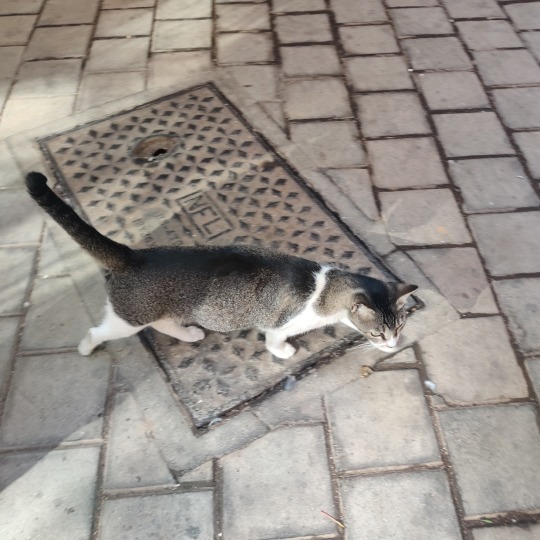

🍄 Pile 1
☆ You were someone who was constantly transforming, both spiritually and mentally and may have gone through multiple cycles. You were someone who took things in stride and believed that everything will turn out well even if it didn't seem that way. You had a tendency to change a lot in a small period of time to the extent of people not recognising you, you may also have been extremely intellectual and learned, being interested in the arts and subjects like philosophy or psychology. You wanted to get to the bottom of everything in existence and were very curious. However, you also tended to be stuck in the past, reliving old days and collecting old ornaments, nostalgia held you back. You didn't travel a lot nor did you want to, you were set in your ways and your self-doubt led to you missing out on opportunities that would have made you thrive.
☆ Your life on the other hand, was nothing short of glamourous. You were probably born in a wealthy and well to do household with servants and butlers, people were at your beck and call. You may have been close to your father and he may have had a huge impact on you and your decisions. Your life looked perfect from the outside but it was not what you desired. You wanted to make a name for yourself however could not due to restrictions put on you by your family members. You may have tried to stand up for yourself but were only lectured or turned down. Your sibling’s nay has gotten more chances than you did and you felt life to be unequal and unfair. You may have had an unstable family life, and their unhappy marriage may have affected your views on love.
☆ Initially you did not feel fulfilled in your long-term relationship and both parties may have been involved in infidelity and bring closed off about their relationship. This relationship could have been established against both of your wills as a business deal or relationship for the profit of the families rather than the individuals. This harboured a lot of negative feelings from both of your sides, and you both were unwilling to commit. You may have left your home to go be with this person. However, as time passed, you leading to a deeper level of emotional understanding. From this point on, it may have felt like fate or magic that brought you two together. You may have had one child together.
☆ You've learnt your karmic lessons in your previous lifetime and this lifetime is like a blank slate. You understand and accept how the universe is trying to guide you and are more spiritually enlightened, you may have psychic abilities that may be related to your calling in life. You're starting over completely and you will feel called to indulge and try out different activities and hobbies, and enjoy life at its fullest.

🍄 Pile 2
☆ You were indecisive and lacked direction in life. You felt trapped in every situation you were in and were quite pessimistic, which developed a lot of self-limiting beliefs you never tried to grow out of. You were a fatalist and believed you couldn't do anything to make your life better, and were doomed from the start for a lack of better words. You may have been apathetic and a sceptic and were quite discontent and angry with the universe. You may have spent hours, days even months soul searching, you loved nature and believed that it had the power to heal, you may have liked meditating in caves. You tried to be introspective and listen to your inner guidance, but due to your impulsiveness you never did.
☆ You may have lived a life that was lively but you didn't feel like you belonged. Your family may not have been the most well off but you made it work. Seeing them struggle you may have taken it upon yourself to study and educate yourself to find a way to help. You planned a lot and spent loads of time trying to decide what to do, only to come up empty handed because you believed you wouldn't want to live an empty life. You may have gone through a lot financially, and faced homelessness in your adulthood as well as a myriad of financial problems and health problems leading to a lot of loss. Your feeling of not belonging lead to you lashing out at people randomly making you stay away from romantic relationships, being averse to the very idea of it, you may have gone through more than one marriage due to separation or divorce.
☆ You may not have been the luckiest in matters of the heart either as your relationships may have fallen apart due to lack of communication and secrets from either of the parties, you may have gone through a divorce or your s/o leaving you in the past for someone else, however when you did end up meeting someone that you felt comfortable with, you tried your best to communicate with them. You may have felt like your love and affection towards them was illegal (I'm getting lgbtq+ vibes but it can be a secret romance or inter-religion/caste too) and that you need to get rid of your feelings before either of you get in trouble. You may have been avoiding the reality of the situation at the start but after a period of time you may have decided to either get together regardless of what people say, or, eloped. This made you feel free and content, however there were still certain commitment issues and the love fizzled out after a brief period of excitement, and did not procreate rather choosing to live a calm and peaceful life alone in the hills.
☆ Your lesson to learn in this life is to find value in things that are not necessarily materialistic and to stop trying to run after money, and let it flow into your life naturally. You're meant to learn how to balance work and life without burning out in both areas, and learn how to actually execute your plans and work on them rather than simply staying in the planning stage. You need to learn how to accept challenges without doubting your abilities and skills because you already possess what you need.

🍄 Pile 3
☆ You were an extremely traditional person and held strong conventional ethics and morals that made you come off as a perfectionist or stickler for the rules. You were an extremely 'by the book' person and believed that nothing could go wrong if you followed all the rules. You were also extremely religious and prayed every morning, you may have felt very connected to the divine and felt that someone was watching over you. You may have been overbearing and harboured a lot of insecurities especially in regards to your own self but physically and mentally and felt like you were never growing or moving forward.
☆ You may have moved slowly in your life, you may have had a strict and traditional upbringing, with your family being close knit and extremely loving. You had very supportive people around you that always tried to lift you up no matter what and offered their wisdom and advice whenever you needed it. You may have progressed slower than others in terms of your career, but your uncertainty never stopped you from doing what you wanted. You may have travelled a lot in search of what you want to do, and may have wanted to teach or be involved in a career that allows you to impart knowledge. You may have faced failure multiple times and put in a lot of effort in everything you did but we're let down frequently before you could find the correct path. You may have worked in a field where you helped guide people or helped children, you were also someone who got exhausted easily.
☆ You may not have had a lot of romantic relationships and had an arranged marriage which was conducted traditionally. You had similar values, ideas and opinions which led you to have great conversations and you gave each other mutual respect. You were both extremely committed to each other and had similar goals which could mean you both worked towards it together, leading to prosperity and abundance in your career after this relationship as you both built each other up. You both will prioritise your relationship and involve each other in your daily lives, keeping the other in the loop. You'll also make big financial decisions together and have a balanced relationship. You may have two kids together as well.
☆ In this life you're meant to learn how to be alone with yourself without feeling lonely. You are meant to introspect and search for what you truly desire deep in your heart and to stop settling for things but rather striving for more. You'll be learning how to be more intuitive and to be open to taking a spiritual path in the future, while making major sacrifices especially in regards to your ideas or beliefs in order to be more open minded.

All Credits and Rights Reserved to Ukiyowi. Do not STEAL do not PLAGIARISE
#pick a card reading#tarot readings#tarot reading#pac reading#pac#pick a card#pac readings#tarotblr#tarot cards#tarot#tarot commissions#tarot community#intuitive readings#intuitive#pick a pile reading#pick a pile#pick a picture
202 notes
·
View notes
Text
Mars in Houses: The Astrological Guide to Action and Energy

Mars, the planet of action, energy, and passion, plays a significant role in shaping our motivations, ambitions, and the ways we assert ourselves. Depending on its placement in the twelve houses of a natal chart, Mars reveals where our energy is most focused and how we handle challenges. Here, we delve into the dynamic influence of Mars in each house, offering insights into its impact on personality, relationships, career, and life choices.
Mars in the 1st House: The Dynamic Initiator
When Mars resides in the 1st house, individuals possess a bold and fearless personality. Their assertiveness and drive make them natural leaders who thrive in competitive environments. However, this placement can also make them impulsive, acting before considering consequences. Physically, they tend to have robust energy and stamina but are prone to accidents due to their recklessness. Learning patience and channeling energy into constructive outlets can enhance their life experiences.
Mars in the 2nd House: The Financial Risk-Taker
Mars in the 2nd house directs its fiery energy toward material possessions and financial matters. These individuals are often ambitious about earning and can engage in risk-taking behaviors when it comes to investments or business ventures. While their confidence can lead to significant gains, it may also result in disputes over money. Cultivating financial discipline and balancing spending habits are key to harnessing this placement’s potential.
Mars in the 3rd House: The Sharp Communicator
With Mars in the 3rd house, communication becomes a battlefield. These individuals have a quick wit and a sharp tongue, making them formidable debaters. However, their directness can sometimes come across as harsh or aggressive. This placement also fuels a desire for learning and exploration, often leading to frequent short trips. Caution is advised during travel, as impatience can result in mishaps.
Mars in the 4th House: The Domestic Commander
Mars in the 4th house brings intense energy to home and family life. These individuals often strive to take charge of their domestic environment, which can lead to power struggles with family members. While they are fiercely protective of their loved ones, their assertiveness might be perceived as domineering. Channeling this energy into creating a harmonious home environment can help mitigate conflicts.
Mars in the 5th House: The Passionate Creator
Creativity and romance are ignited when Mars occupies the 5th house. These individuals are enthusiastic about their pursuits, whether in love, hobbies, or creative endeavors. Their competitive streak may drive them to excel in sports or other recreational activities. However, their penchant for taking risks, whether in love or gambling, requires moderation to avoid potential pitfalls.
Mars in the 6th House: The Tireless Worker
Mars in the 6th house signifies a strong work ethic and a desire for productivity. These individuals are highly motivated employees or leaders who thrive on challenges in the workplace. However, conflicts with colleagues or health issues stemming from overwork and stress can be concerns. Incorporating regular relaxation and self-care routines is essential for long-term well-being.

Mars in the 7th House: The Energetic Partner
Partnerships, both personal and professional, are energized by Mars in the 7th house. These individuals are drawn to dynamic and assertive partners, often finding themselves in relationships filled with passion and occasional conflicts. While their competitive nature adds excitement to their unions, it can also lead to frequent disagreements. Finding balance and mutual respect is crucial for harmonious partnerships.
Mars in the 8th House: The Fearless Transformer
Mars in the 8th house imbues individuals with intense and transformative energy. They are drawn to exploring deep and complex areas of life, such as psychology, spirituality, or taboo subjects. This placement often brings a strong survival instinct, helping them navigate challenges. However, disputes over shared resources or inheritances may arise. Developing trust and open communication can help resolve conflicts.
Mars in the 9th House: The Adventurous Scholar
A love for adventure and learning characterizes Mars in the 9th house. These individuals are driven by a thirst for knowledge and often challenge conventional beliefs. Travel, both physical and intellectual, plays a significant role in their lives. While their enthusiasm is infectious, it’s important to temper impulsiveness, especially during travel or legal matters.
Mars in the 10th House: The Ambitious Leader
Mars in the 10th house highlights ambition and a strong desire for professional success. These individuals are natural leaders who thrive in competitive careers, such as business, engineering, or sports. However, conflicts with authority figures or overestimating their capabilities can hinder progress. Maintaining humility and building strong professional relationships are key to long-term success.
Mars in the 11th House: The Dynamic Networker
Friendships and social networks are energized by Mars in the 11th house. These individuals are highly motivated to connect with others and often take leadership roles in groups or organizations. However, their assertive and sometimes argumentative nature can lead to conflicts with friends. Choosing supportive and like-minded companions is essential for positive social experiences.
Mars in the 12th House: The Subtle Strategist
Mars in the 12th house operates behind the scenes, making these individuals introspective and strategic in their actions. They are often drawn to spiritual or humanitarian pursuits, channeling their energy into helping others. However, secrecy or suppressed anger can lead to inner turmoil. Regular introspection and open communication are essential for emotional balance.

Mars’s placement in the houses provides profound insights into how we assert ourselves, face challenges, and pursue our passions. By understanding and working with these energies, we can unlock our full potential and navigate life’s complexities with greater ease.
#zodic signs#astrogurujimayank#astrology#astrology blog#horoscopes#zodiac#12th house#astro tumblr#jyotish#sidereal astrology
49 notes
·
View notes
Text
in the defence of Ruki Mukami - why Ruki's trauma has just as much influence on his actions as everyone else
i am sitting in the chemistry library at uni right now and am going to spend my time on the most useless task ever to avoid doing anything impactful. please don't take this too serious because i can't write meaningful character analyses.
so i've seen a ton of stuff around, because i know Ruki's not one of the best loved characters in the western fandom. well, of all the characters, i see nearly the most Ruki hate. and obviously everyone is entitled to their opinions, whatever. but what DOES bother me is the reason.
a lot of people say that Ruki's trauma doesn't correlate to his actions, or explain abusive behaviour in the same way that the other characters' do. and i would die for Ruki and we know this, but i've thought about it a lot and i have a Theory as for why some people seem to view his character this way. (i have also studied neuroscience at degree level and learnt about trauma and synaptic plasticity)
to summarise for those who perhaps haven't read all the games (my sources for all this is basically Ruki's MB, DF, and LE), Ruki was born as an only-child in Romania to a rich family, and his father was revealed to be a politician during the Ceaușescu period in Romania. they had a lot of servants, all of whom Ruki learnt from a young age to abuse. he admired his father very much and looked up to him, and his mother was good to him and was close to his father. it would seem like a very good, perfect family - although i'll briefly discuss later why this wasn't necessarily the case.
unfortunately, in the DL universe lore, Karlheinz and Ceaușescu were buddy-buddy politicians, and Ruki's father was eventually chased out of his position. during his downfall, Ruki's father became an alcoholic and began abusing Ruki's mother, verbally and physically. Ruki saw a lot of this as well: somebody he looked up to, admired and trusted, becoming an abusive monster in a very short period of time. i think that's part of why Ruki overlooks Karlheinz's crimes and sees him as a good father anyway.
not only that, Ruki's mother - once again somebody who nurtured and cared for him - turned out to be having an affair. and shortly after that, his father committed suicide: something Ruki actually walked out on.
that in itself is a lot more traumatic than i think people consider. a lot of the DL characters have long-term trauma, but intense sudden trauma, such as your "perfect" life falling apart due to an alcoholic, abusive father killing himself and his mother having an affair, has similar psychological impact. remember, these are people who were supposed to care and nurture him, he trusted them a lot, and they both abandoned him abruptly in very extreme ways. that's the number 1 root of Ruki's trust issues. he's been seen to cut Yui off entirely because he's scared of becoming his abusive father.
similarly, living in a "perfect" household as a spoiled only child can be inherently traumatic. i don't know about you guys, but i've met some (only some, not the majority) of very, very emotionally constipated spoiled only-children. a lot of children showered with materialistic affection are missing key emotional maturity developments. their outlook on life is very narrow and they lack the emotional components of attachment; this is part of why Ruki is quite emotionally immature.
not only that, but growing up as an abusive sociopath to "lower" members of society such as servants is a form of abusive on his parents' behalf. they did not teach him proper world awareness. some children are born as psychopaths etc, true, but the majority of "sociopaths" (diagnosed as ASPD) are that way because they were not taught remorse as a child. Ruki would've learnt to treat his servants that way because that was how his parents did (and we see his father being a dick to the servants in LE too i think), and that in itself is inherently traumatic too.
imagine then, with very little capacity for remorse or a concept of societal hierarchy, being thrown into an orphanage. Ruki is a dick to everyone, yes, but the shock of having everything you know challenged suddenly and without explanation or support is going to cause further trauma. i think people just don't like to consider the fact that a lot of "sociopaths" (again, ASPD is the correct label there) were victims too. he went from being the "master" to being "livestock" and that's going to very rapidly alter your young brain chemistry, entering a "master" mindset as a defensive mechanism. that's why he gets angry/upset/confused when it's challenged.
Ruki has a fuck ton of PTSD as well - he's the only character who i've seen literally throw up MULTIPLE TIMES when experiencing flashbacks.
but i think people generally know that, perhaps not thinking about it as deeply. my Theory as to why people don't seem to see this as being as "extreme" as the other boys' trauma goes further than that.
diabolik lovers follows this dynamic between the Sakamaki's vs Mukami's, whereby Yuma, Kou and Azusa (Yuma and Kou more strongly) have this mindset of "the Sakamaki's can't have trauma because they were rich" and obviously as readers, we're supposed to be like "um, no, the Sakamaki's can have trauma too" because they do.
with that said, Kou and Yuma do successfully get to Subaru/Laito and Shu's heads respectively with this narrative. especially Subaru and Shu who get really fixated with this "i was a spoiled, privileged kid" and because of that, naturally we, as readers, lean towards feeling sorry for the Mukami's especially.
obviously, Ruki is the odd one out when it comes to the Mukami's. he had a sheltered upbringing whereas the other brothers were fighting for their lives in poverty/on the streets, victims and witnesses of the civil war and orphan crisis. Yuma particularly pushes this "Ruki had it easy" notion too, and i've definitely noticed that a lot of people who don't particularly like Ruki tend to fall towards that.
this idea of "not enough" trauma has enough to unpack as it is and we won't do that to, but personally i think that all of Ruki's abusive actions are justified. no, they are not an excuse. none of the diaboys' behaviour is excusable, but i think Rejet did quite a good job of giving them enough fucked up backstory to make us as readers at least understand why that might be how they act.
and from what i see, it seems to be Ruki who people think is the exception to this the most, because his trauma isn't in the same vein as the rest of the Mukami's. the "rich people can't have trauma" narrative gets pushed so hard that i think people forget 1) it isn't true and 2) Ruki went through a ton of fucked shit as a kid, and i don't think any of his actions made me feel any differently than the other diaboys' awful behaviour towards Yui.
you can find Ruki boring, not interesting, or just not your type. but he very, very much has "sufficient" trauma to explain his toxic and dominating actions. thank u for coming to my TedTalk.
144 notes
·
View notes
Text
The Complex Interaction Between Insecurity and Friendship: Alice Swayne and Chise Hatori
ok so this post has been sponsored by @thornswoggled who has asked me to write about this (hiiii)
This is a post about an analysis that I wrote years ago to which I have added the part about how Alice would react if she knew the relationship between Chise and Joseph (you can skip everything and go to the end and get to that paragraph but you will not find new information either, I recommend read all for more context)
Ok i have to apologize, this is very long, i can´t do short things i just can´t i tried so get comfy
let´s staaart!
Introduction
This essay explores the psychological scars left by Alice's childhood, the common characteristics she shares with Chise, and the potential for rivalry between them as their relationships and place in society evolve.
The Psychological Impact of Alice's Troubling Past
Alice Swayne's personality is deeply influenced by her traumatic childhood, which can be understood in terms of *post-traumatic stress disorder (PTSD)* and *attachment disorder*. Abandoned at a young age and forced to survive in a dangerous environment, Alice developed a strong sense of loyalty, particularly towards Mikhail Renfred, who rescued her. However, this loyalty is accompanied by deep insecurities and a persistent fear of abandonment, typical manifestations of *avoidant attachment disorder*. Her childhood experiences may have caused psychological issues such as low self-esteem, anxiety, and a strong need for approval, characteristics of *dependent personality disorder*. These insecurities drive her to constantly prove her worth, sometimes at the expense of her own well-being. The trauma of her early life leaves her vulnerable to feelings of inadequacy and fear of being replaced or forgotten, especially by those she values most.
It can also be noted that this combination of issues may result in difficulty forming healthy relationships, hypervigilance, and feelings of guilt and shame regarding past attitudes and reactions.
Similarities Between Alice and Chise
Despite their different backgrounds, Alice and Chise share several significant characteristics that form the basis of their friendship. Both have endured painful pasts marked by abandonment and a longing for acceptance, which can be related to the concept of *existential loneliness*. This shared history creates an implicit understanding between them, as both know the pain of loneliness and the desire to find a place where they truly belong.
Their loyalty and devotion to their respective mentors, Renfred and Elias, also connect them, and both characters are willing to make significant sacrifices for the people they care about. Furthermore, both Alice and Chise struggle with insecurity and low self-esteem, often questioning their own worth. This shared vulnerability allows them to empathize with each other's difficulties and provide support when one of them doubts, which is an example of *social and emotional support*.
The progression of their relationship can be schematically outlined as follows:
Stages of Their Friendship:
Initial Distrust:
Description: When Alice and Chise first meet, there is evident distrust and rivalry, especially from Alice. This is partly due to Alice's insecurity and fear that Chise might be a threat to Renfred or that she might not be worthy of his time.
Respect and Recognition:
Description: As they interact more, Alice begins to see Chise in a different light. She recognizes her strength and value. This changes her initial perception.
Mutual Support:
Description: As their friendship deepens, Alice and Chise begin to support each other in times of need. Both have difficult pasts and find comfort in their mutual understanding. This mutual support allows them to grow both emotionally and personally.
There came a point where Alice found something she thought she would never find, someone she believed was similar to her, with a very similar past and seemingly similar traumatic consequences, which is why Alice makes an effort to guide and care for Chise. Essentially, we can see in the way Alice treats Chise the same relationship that exists between Chise and Philomela, albeit on a much smaller scale. However, thinking of someone as being just like you is a notion that can easily shift from love to hatred, and thus it should be discarded immediately. Someone can be very similar to you, but never identical.
The consequences of this way of thinking are evident in the following.
Potential for Rivalry: Alice's Perspective on Chise
Despite the strong foundation of their friendship, the relationship between Alice and Chise is not without its challenges.
Initially, Alice might have viewed Chise as a competitor, particularly because Chise possesses unique and powerful abilities like Sleigh Beggy, which distinguish and make her valuable in a way that Alice might envy. The fact that nearly all characters show such interest in Chise could exacerbate Alice's fears of inadequacy, leading her to see Chise as a rival seeking approval and recognition, a phenomenon that can be understood in terms of *performance anxiety* and *evaluation sensitivity*.
An additional factor that could intensify the perception of rivalry is the apparent ease with which Chise forms and maintains friendships. Unlike Alice, who has struggled to establish deep and lasting connections due to her traumatic past and insecurities, Chise seems to have greater success in forming meaningful bonds with others. This perception that Chise has an innate ability to connect with people might make Alice feel more insecure, as she could interpret it as a lack of social skills in herself, which may be associated with *difficulties in forming interpersonal relationships* and *social inadequacy*.
The potential rivalry might also be fueled by differences in the nature of their relationships with their respective mentors. While Chise has a more emotional and close relationship with Elias, Alice’s relationship with Renfred, from Alice's perspective, is more professional and based on proving her worth (which she dislikes), reflecting an *anxious attachment disorder*, whereas from Renfred's point of view, it is a paternalistic relationship. Alice might feel that Chise has an advantage in receiving emotional support and guidance, which could make Alice feel neglected or undervalued in comparison.
Additionally, Alice might perceive that Chise is achieving what she herself desires: a sense of belonging and unconditional acceptance, something Alice has longed for but has not always received from Renfred in the way she wishes. This perception could heighten her feelings of rivalry, as Alice might fear that, in the eyes of her mentors, Chise is occupying a place she herself wishes to have, a sentiment that could be interpreted as *fear of rejection* and *self-image insecurity*.
All these terms can be encompassed under social comparison and intrapersonal jealousy.
The person Alice initially sees as her equal begins to have a seemingly better life than hers, a life and environment that forgives all mistakes, while Alice feels stuck, with stagnant personal relationships, and her mistakes come at a high price (Alice couldn't defend Renfred and as a result lost his arm, an arm that will not grow back).
Given all this, and considering the recent trending discussion here about Joseph/Cartafilus,
What would happen if Alice discovered that Chise is protecting and hiding Joseph?
The discovery that Chise is protecting Joseph/Cartafilus, a figure who has caused Alice significant harm, adds a complex layer to Alice's internal conflict. Joseph/Cartafilus represents pain and betrayal for Alice, and his presence in Chise's life might be seen as a personal betrayal by Alice. She could be overwhelmed by anger and frustration upon seeing Chise defend someone who has hurt her, intensifying her feelings of mistrust and insecurity. This act could make Alice feel excluded and dismissed, perceiving that Chise does not fully recognize the negative impact Joseph has had on her life. Additionally, Alice might face a profound internal conflict between maintaining her friendship with Chise and protecting herself from those who have caused her harm, which could trigger an identity crisis and doubts about Chise's loyalty. This would be a significant shock, potentially exacerbated by Chise's response or even if she chooses to remain silent.
#i mean Alice thinks Chise and Elias relationship is weird asf ok#she is just jelaous of the closeness#seriously i apologize omg i am so bad at sumarizing things#ancient magus bride#tamb#mahoutsukai no yome#mahoyome#the ancient magus bride#the ancient magus' bride
31 notes
·
View notes
Text
Random talk on Mars Fall in Cancer (Sidereal)
Weakness of a planet can show up as that planet being extremely over active. For example having a Cancer Mars could mean a lack of discipline, being extremely defensive, self sabotaging.
What happens when the immune system attacks itself?
Mars is the defender and protector to both luminaries, the sun and moon, which represents mind and body
Mars in Cancer can be very unstable place because now your defense and protection is guided by the moon.. which can be a subjective realm.. as moon is our psyche. The same psyche that is impacted by the ebbs and flows of hormones. When things are out of wack psychologically, then where is the proper discernment to know how, when, where, and what to react
I also want to acknowledge the importance behind the maintenance of one's nutrition and mental health when having Mars in Cancer. The moon operates in phases, so the new , full, waxing and waning periods would now have influence on the direction Mars moves in.
Mars is strategy. It's exaltation in Capricorn supports and factors in the long term consequences of one's action. The Moon is quick moving opposed to Saturn, therefore one might not plan far enough ahead and can only see for the moment, however long of a moment that is. In the long run, one might discover that their original plan of action is unsustainable because of other factors they didnt consider. Mars in Cancer can be temporary motivation too.
Moon is built for comfort as well ,so in reality , who wants to be in fucking pain internally?
* note that astrology is nuanced and the whole chart always has to be considered. This is general.
#astro notes#astrology#astrologer#astro observations#astrology community#witch community#spiritualawakening#sidereal astrology#astroblr#astrologist#mars in cancer#sidereal cancer#astro content#astro community#vedic astrology#astrology on tumblr#astrology observations
102 notes
·
View notes
Text
RAHU IN 5TH HOUSE AS PER VEDIC ASTROLOGY
In Vedic astrology, Rahu is one of the two lunar nodes (the other being Ketu), and it represents illusion, obsession, desire, foreignness, technology, and sudden events. Although it is not a physical planet, its impact is profound and karmic. Rahu amplifies and distorts the qualities of the house it occupies, pushing the native toward intense experiences and transformative lessons.
Readers please note that this is in general and it will very from horoscope to horoscope as per the placements of the planets.
When Rahu is placed in the 5th house of the natal chart / horoscope, it brings both powerful blessings and serious challenges, depending on its strength, aspects, and conjunctions.
The 5th house governs intelligence, creativity, romance, children, education, and speculation (like gambling and stock markets). This placement can be particularly potent, as Rahu stimulates intense desire in the areas represented by this house.
Below is a detailed analysis of the positive and negative results of Rahu in the 5th house, extending to around 800 words:
Positive Results of Rahu in the 5th House
1. Unconventional Intelligence and Creativity
Rahu in the 5th house can bless the native with brilliant, original thinking. These individuals are not bound by traditional patterns and often come up with creative, cutting-edge, or radical ideas.
They may excel in fields that require innovation, such as artificial intelligence, technology, film, media, advertising, psychology, or the occult sciences.
The native’s mind is inquisitive and curious, and if positively influenced by benefic planets like Mercury or Jupiter, this placement can result in intellectual brilliance or genius in specific fields.
2. Success in Speculative Gains
Rahu’s influence on the 5th house can generate a strong interest in speculative activities, such as stock markets, cryptocurrency, gambling, or betting. If well-placed, it can bring sudden and substantial gains through risky investments. Rahu provides strategic insight and a willingness to explore uncharted territory, which can lead to financial windfalls.
3. Magnetic Romantic Appeal
This placement often makes the native magnetically attractive, especially in romantic contexts. There is a mysterious or exotic quality in their personality that draws others to them. They might experience intense, passionate love affairs, and may be particularly drawn to foreign or unconventional partners.
4. Foreign or Unusual Children
Rahu in the 5th house can indicate gifted, intelligent, or spiritually unique children. In some cases, the native may have children in a foreign land or raise adopted children. Their offspring may display exceptional talent or have a role to play in the native’s karmic evolution.
5. Reputation through Creative Work
This placement can lead to public recognition in creative or entertainment fields. Rahu gives a craving for fame and visibility, and when channeled well, the person may become a popular public figure, artist, writer, actor, or influencer.
Negative Results of Rahu in the 5th House
1. Obsessive Desires and Illusions in Romance
One of the major drawbacks of Rahu in this house is a tendency toward obsession in romantic matters. The native may fall into intense, short-lived relationships based on fantasy rather than reality. There may be deception, betrayal, or hidden motives in love affairs.
Uncontrolled desire can lead to emotional instability, heartbreak, or scandal. The native may become entangled in illicit or socially inappropriate relationships.
2. Mental Restlessness and Confusion
Although Rahu can sharpen intelligence, it also brings mental instability. The native may suffer from anxiety, obsessive thinking, or a constant desire to outsmart others.
If afflicted, it may cause confusion, delusions, or irrational behavior. They may struggle with focusing on long-term educational or intellectual goals.
This restless energy can lead to disconnection from reality or make it hard for the person to feel satisfied with their accomplishments.
3. Difficulties Related to Children
Rahu in the 5th house often causes delays or complications in childbirth. There may be miscarriages, fertility issues, or difficulties in the relationship with children. The native might worry excessively about their children or feel estranged from them.
In some cases, the children might be rebellious, unconventional, or involved in controversial paths. There can also be karmic baggage associated with parenting, leading to emotional strain.
4. Risk of Gambling Addiction or Financial Losses
While Rahu can bring gains from speculation, it also brings temptation and lack of judgment. The native may become addicted to gambling, trading, or betting. Overconfidence and greed can lead to sudden losses or debt if the person doesn’t maintain financial discipline.
This placement can create a gambler’s mindset, where the thrill of risk becomes more important than the outcome.
5. Problems in Education
There may be interruptions or breaks in formal education due to distraction, rebellion against conventional learning, or a desire to pursue unusual subjects. The native may not complete their education through traditional routes, although they may still become self-taught experts in specific areas.
Thus Rahu in the 5th house is a powerful and karmically significant placement. It brings the potential for extraordinary creative success, intellectual brilliance, and magnetic charm—but also carries the risks of obsession, deception, and emotional instability. The native is challenged to balance desire with wisdom and to use their unique gifts for constructive, rather than self-destructive, purposes.
Whether Rahu becomes a blessing or a burden depends heavily on its aspects, sign placement, conjunctions, and the overall strength of the natal chart. With awareness, discipline, and spiritual grounding, this placement can be transformed into a source of genius and fulfillment.
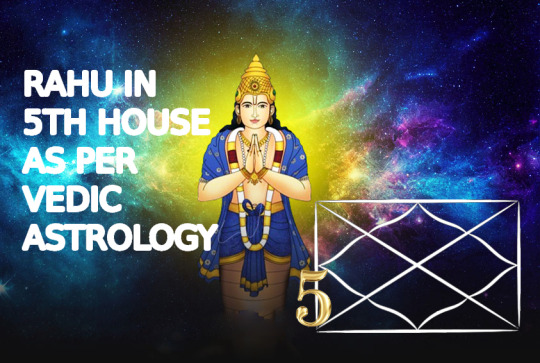
#rahu in 5th house astrology#astrology remedy#vedic astrologer#astrologer#horoscope readings#vedic astrology#horoscope posts#vedicastrology#horoscope#horoscope analysis#astrology#horoscopes#daily horoscope#daily astrology#indian jyotish#vedic jyotish#kundli
11 notes
·
View notes
Note
On your Romerica rambling post, you said that their situationship was off during the 30's and 40's, and that it deserved it's own post because of the complexities of the time period. I actually share this same hc!!
Tho I was wondering if u were ever gonna follow up on dat w another text post?
HIII ! actually I'm glad you asked! honestly I've spent a long time thinking about their dynamic so anyone asking is like "neuron activated" after months of college work and psychological torture. whoa that txt post is like a year and a half overdue since. So I'll use this ask as an excuse to elaborate on my thoughts
DISCLAIMER i do go down the historical route as a way to elaborate how events would impact their dynamic and then into how it shapes the two individuals as symbolic to their nations. My intention is not to water down historical events to ships. Also I've always been really into history as a personal hobby even before hetalia so I will geek out.
During the 30s envisioned them as having a natural falling out as a result of them no longer living together. Adding to that how they both had bigger issues to deal with in their own home countries. Up to then maybe some feelings of fondness for what was until there wasn't.
Now the 40s is very interesting to me because I rarely see people mention it but i think its important because of Operation Husky 1943 aka the anglo-american offense on southern Italy and Operation Underworld 1942 since it is related with espionage in ports that led up to Operation Husky.
To put it frankly I don't think any characters had a "truly healthy" relation with each other during ww2 even those that were allies of each other in general (but that's just my opinion). Now considering the first strong interaction they have after like a a decade of a falling out is being on "opposite" sides of a war, that's quite a lot already. I say ""opposite"" in air quotes simply because at the same time historically Italy is divided in civil war between the fascists and resistance. I personally see romano as symbolic to the resistance (idk if this even qualifies as a hc bcs i think its kind of implied in canon hetalia).
dynamic wise its bittersweet. i find that in terms of the characters its like reuniting with someone you spent time with a lot and maybe you do hold some fondness even after falling out. but like its under the worst circumstances. Where it is way more bitter than sweet as a result of conflicts where as a nation one is very weak at least compared to the other side. On romano's end i've hc that despite collaborating with the anglo-american forces against the axis. It wouldn't warrant full immediate trust. Because by all means they could be taking advantage of you. To an extent my hc is that he is partially right, at least in the way America could use their past bond as an advantage. I don't believe the transition was easy for either to get back to "trusting each other" like before. However, it makes sense for me that around the 50s it's different. (I would like to do another deepdive into their dynamic in this era as well)
I think its important to mention how the US' role in WW2 (historically) isn't simply that of the "hero." (yes unfortunately a lot of people in the hetalia fandom have a very usamerican washed version of history where ppl think they can just repeat the "america is just doing his best bcs he wants to be a hero " sentiment uncritically simply because they like the character (I already have my issues with this in canon at times). i might sound like I'm making this too deep but I find it to be an important disclaimer just in case to not conflate hetalia characters with the countries in a way that makes people uncritically look into a country's role in history.
In hetalia, interestingly enough the only mention of romano + america during ww2 in hetalia is in this specific moment. where romano is kinda terrified. which is veryyyy surface level bcs yk its hetalia. Still I feel like this decade is something that can offer a lot in terms of exploring their dynamics if you aren't bound by canon/
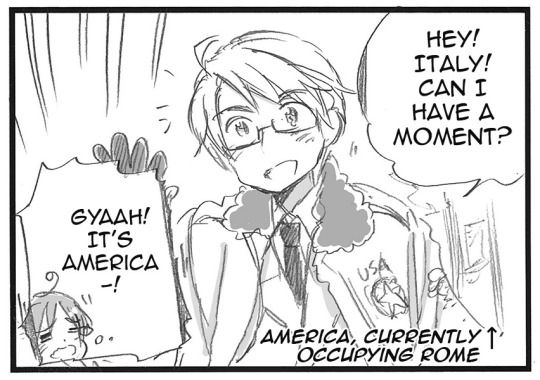
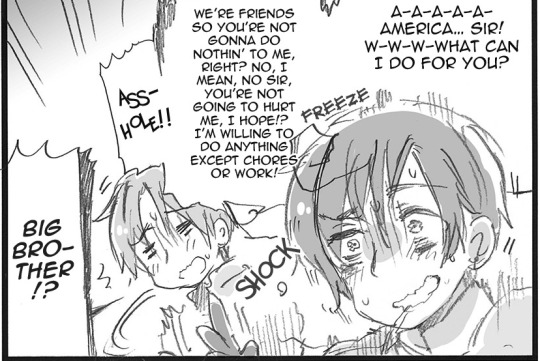
I'm always a 50/50 believer when it comes to the "hetalia characters as personifications of their government" vs the "hetalia characters represent their people" because governments impact people and nations relations and people impact government. So yes I did go very historical. If you know me, I'm pretty big into highlight the importance of at least having a grip of the history to understand why certain characters act the way they do in canon. (even though its fair to say fuck canon a good amount of the time)
I hope I was able to elaborate the complexities with the right amount enough nuance :) let me know if you would like me to clarify any hcs
8 notes
·
View notes
Text
Some Personal Thoughts on Disability in Enstars
disclaimer: disability is a very broad term that covers many different experiences. i will be talking about physical disabilities since i feel most comfortable doing so/have experience with them. obviously that ignores a Huge part of what disability and chronical illness is and can be. but i think it is beyond my capabilities to talk about experiences i don't know much about.
alt caption: i think ritsu is a good character and im trying to explain to myself why
this is sort of a long post, sorry.
content warnings: i talk about ableism and touch on related topics such as dehumanization and objectification and such below. individual parts of this post have their own cw's.
Enstars Writing, Beloathed
to get this out of the way; it is bad sometimes. this is discussed very often. it doesnt depend on the authors either, in my opinion, some writers will hit you with something really troublesome only to (seemingly accidentally) invent human emotion and compassion in a different story. i dont want to repeat what others have said eloquently but there is a fair amount of imperialist worldviews, xenophobia, just racism really, transphobia, ableism, and copaganda to be found in enstars. this isnt about x character being x thing, but about how it is very noticable when the author of a story holds these worldviews and they bleed into their stories.
so that is not the greatest foundation if youre looking for well-written disabilities. but i wouldnt be reading enstars if i didnt think it genuinely is really really good sometimes. in my opinion, the way disabilities are portrayed is a mixed bag overall but there are some extremely worthwhile bits that touched me quite a lot.
What I personally understand as Well-Written Disability
the way disabled people suffer often goes unnoticed, and disabled people dont have a platform to talk about oppression. a lot of life-changing issues can go unnoticed to those unnaffected by them, even if they are in broad daylight: underfounded or entirely lacking healthcare, the way many healthcare systems are marketbased and ethics are prone to suffer bc of this (even under 'welfare' capitalism), a lack of equal marriage, the inaccessibility of the most basic and necessary facilities, financing care and the dependency on family/loved ones (both a logistical and psychological problem), the huge stigma against disabled people, etc, etc, you get me....
we need to write about people who need care, to keep them in mind at all times. disabled people are not a minority in a mathematical sense but in a hierarchical sense. it is naive to think of them as "a substancial percentage" of populations. as we age, we inevitably all enter the stage of needing care at some point. SO to an extend, i want to claim its a topic that affects every single person. yet disabled people are rarely a central topic anywhere. it is not enough to acknowledge them, we need to plan and think with them in mind. and Write with them in mind, i guess.
SO when i see fiction grapple the topic, i am usually really happy, even if the portrayal isnt ideal. (critical, maybe, but generally speaking very happy) pointing out "badly" written disabled characters is obviously not as easy as calling someone out for uncritically saying "i think eugenics are a good idea!!!" through fiction. people with that sort of facist mindset exist of course but ableism does not end there.
if i were to single out things i see often: i think the most disappointing thing a story can do is to - mention a disability without it ever having an impact on people in the story (-> the disability is basically nonexistent, has no impact or relevance, outside of a theoretical mention) OR - uncritically use a disabled character as a mere plot devise, without granting them the ability to speak (-> dehumanization, a lack of understanding that disabled people are, well, People. they do shit.)
and then of course there is fetishization, both in a literal sense and in an inspiration porn sense and the problem of turning disability into a caricature for jokes (either to other disabled people for their behaviour/body or to create a sense of satisfying superiority by laughing at them) but i feel like those problems explain themselves.
to apply these to very basic examples: i think often something like a robotic sci-fi prosthetic is not a good way to represent a disability because it fails to represent what people go through irl and provides a "magic fix" without repercussions. here is a really good post about it. about the plot device issue... i think it is similar to what people often criticise as "manpain". a disabled person will never appear or speak, they are demoted to being the reason an able-bodied character acts a certain way, like a lifeless accessory. this doesnt always have to be bad, esp if its just a sideplot! but it can get tiring if the audience never gets to learn about other aspects of the unseen character in question and we are only introduced to their suffering.
all of this to talk about gacha idol boys. it is how it is. anyway, this is roughly my mental state when i tackle enstars.
disclaimer 2: i am really just a kogaP. this influences which characters i encounter when reading. there are tons of stories i just never looked at and there is SO MUCh lore i just dont know about. please lemme know if you have additions to stuff i say/understand a character better/have related story recommendations! tl;dr the sakuma bit will be long.
disclaimer 3: i genuinely adore every single character mentioned below and am always excited to learn smth new about them. if i criticize writing, that has nothing to do with that character or their fans. it is about the writers.
the most obvious example. Eichi (content warning for brief mentions of self harm and suicidal ideation)
everything eichi does, he does with the knowledge he will most likely die young. that is a truly dramatic setup.
but before i get back to that thought. it always felt to me like eichis illness(/es) lack a certain sense of conciseness? i do not think you need to put a name and diagnosis on it for it to be relatable and real to readers, tbh!! though to achieve believability, there needs to be a good amount of consistency. what i can recall off the top of my head is the following:
he breaks down/straight up blacks out frequently due to weakness and dizzyness
measures were taken to secure his safety in those situations (the infamous Eichi-kun Gauge as seen in Element)
his stamina is seriously low
he coughs a lot
we saw him cough up blood (Daydream)
he relies on long hospital stays because his health needs to be monitored and/or supported this closely
he stays inside a lot (hinting towards problems with his immune system?)
being healthy enough to eat unhealthy food is a big deal to him, so there are dietary restrictions/it was necessary to precisely control what he eats
his grandfather, who died recently, is considered an outlier for how long he lived (so it IS hereditary)
which..... could be a lot of things...? or, more likely: a culmination of many things at once. if you have headcanons on eichis health, please lemme know!
but in addition to eichis terminal illness, there is a second quality to him that separates him from most disabled people: he is extremely wealthy. and his wealth is fundamentally important to stories. usually illness and poverty go hand in hand, since income is tied to the ability to work, which worsens an already bad situation. no matter how limited eichis actions are because of his body, the possibilties offered by his wealth make him a central figure in every overarching plot. in addition to this, his family is well aware of his consitution and he is a patriarchal leading figure to them, the head to their coporate hierachy. eichi is free of the things that usually rid the chronically ill of their safety and power: society (he is an idol and popular) and money (he is the richest boy in japan). if youd ask me, i think that while being chronically ill is of course physically taxing, the worse problem is the economic state it puts you in. eichi simply overcomes this? yes, he is terminally ill, his situation is terrifying. but he has an extraordinary amount of control while he lives. more than a poor yet able-bodied person may have.
his unique circumstances enable him to be incredibly active. this is so fun to read about in my opinion. its a fascinating setup to me. without casting any sort of moral judgement on his actions and the antagonistic role he plays; he is, excuse me for my phrasing here, a disabled power fantasy. (at least to me)
this is a double-edged sword to him. because of who he is as a person (ambitious, cunning, ruthless, diligent)
he lives in relative safety but his strong ambition and financial ability to fulfill his dreams tempt him to go past his limits. because his remaining lifetime is uncertain, the need to preserve the body he is given seems uneconomical (a mindset his upbringing and education as an heir to his family would have enforced imo) he is bound to break down sooner or later anyway. i think he begins to see himself and his body as a tool to achieve his goals and neglects spending time on anything BUT working towards them. so the moment he runs out of goals (like at the end of Element), his reason to "remain" becomes futile.
it really struck with me how he appears in Blackbird - emaciated, pathetic, purposefully neglected because he chose to be neglected and weak in an act of self harm bc denying medical attention (something that couldnt have happened otherwise) wataru has to remind him that no one died and the obvious connection to make is that the eccentrics are physically unharmed and starting over, that they should not be a source of guilt to eichi. but i think this is just as much about eichi himself. he might have expected to die since he left the hospital and overexhausted himself at school and as an idol. he didnt die though. it was a real possibility and seemed likely but he didnt. the neglect and indirect self harm here point out, to me, that he saw the "role" he gave himself as fulfilled at that point and waited to die.
eichi stands over economic or social factors that could ostracize and dehumanize him but funnily enough he manages to do so himself by treating his body as a tool and his happiness as an option that got overshadowed by a need to succeed.
this vulnerability makes him, despite how vague the descriptions of his illness are and despite how unrelatable his wealth is, a very satisfying character imo. it is engaging to me. certain limits are removed for him but he created new ones, specifically because he did not see himself as something worth sustaining once he becomes useless. imo, eichi applied the idea that a lifes worth can be measured in its ability to function in an industry to himself. and spiralled over it, entirely inverting his uncanny amount of bodily autonomy. it is clear how the situation he is in worsens his mental health like that. and how his mental health in turn worsens his physical health. it is inseperable.
i cant really get into !! era eichi because i genuinely just dont... know enough. the fine tradition of having a weekly H-Day stands out, though. after all, eichi has new bigger ambitions and is, once again, inviting his own ruin through overexhaustion. so his friends (the new addition of having friends is essential) had to forcefully make him stop for at least one day a week. that is pretty big. i think.
this is true for many marginalized existences so it of course applies to disabled people: if neither your surroundings nor yourself permit you to feel human and therefore assign your person an inherent worth and lovability... sometimes you need a friend to do so!!! social circles are the best support structure for your health.
The Sakuma Family
(i will get into ritsu and rei seperately later on. there are just a few concepts i want to get out of the way that apply to both of them.)
so... to get a little theoretical; the concept of "disability" relies on the concept of a "normative" human existence. "disability" is an otherness and can therefore easily be seen as a "monstrocity" in the eyes of ignorant people, something that instils fear. (there is a reason why a lot of horror exploits disabled bodies as a source of terror and uses mental hospitals as settings) from an able-bodied point of view it seems "desirable" to be a "normative human", yet the disabled person knows that is not a possibility and knows their worth and place as a human in human spaces. at least ideally. able-bodied people sometimes lack this understanding. there is nothing to be desired about an able body or fixed about a disabled body, beyond what medical care can do for ones quality of life.
if you have read operetta, this is all very familiar;
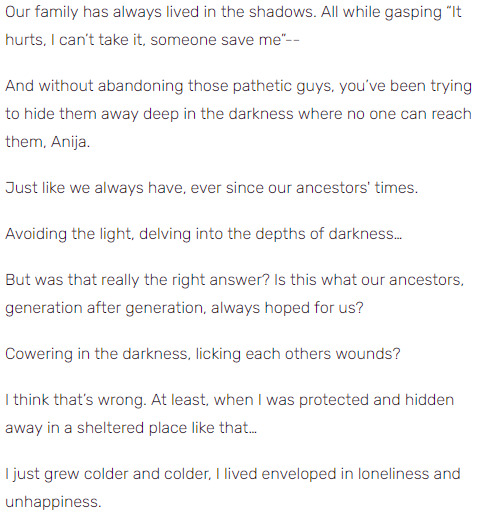
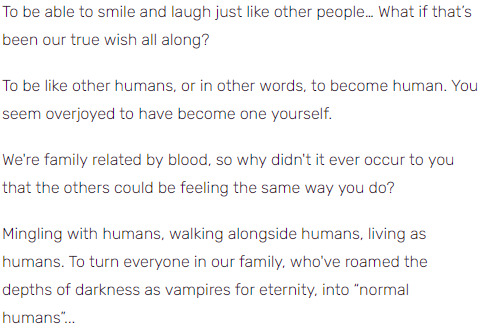
operetta, chapter 17 and, well, here we are. vampires. a very basic truth about the sakuma family that i hate to see denied is that they are human. there is nothing supernatural about them. they are just disabled. or, to turn the idea around, if one was to assign them vampiristic traits and such... is vampirism not a disability and should be taken seriously as such? if you consider the limits a vampire has while coordinating through their life, is that not... strangely just a disabled experience? (MINUS THE KILLING PEOPLE OBVIOUSLY but much modern fiction is sympathetic towards vampires instead and does not display them as violent)
anyway, to hear it from the horses mouth (the horse is rei):
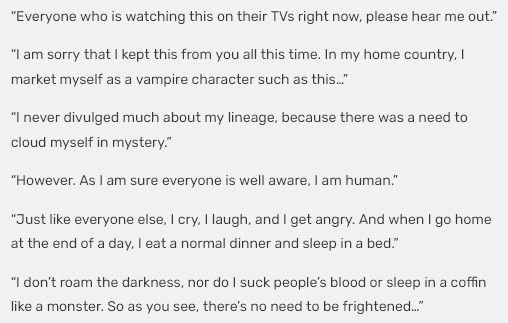
operetta, chapter 19 the sakuma family is a curious case. their condition is hereditary though the severity varies from person to person. it comes up in many stories but for the most part i am thinking about operetta, resurrection sunday, and devils right now. how did this all start? what made an entire family turn to live as vampires, with blood ceremonies and all that? what bizarre kind of generational trauma is this?
(and, while it does not play a role as important as it did for eichi, they are rich. this is important to mention. many normal experiences just dont apply to them because wealth makes them immune. ... how did the sakumas become this influential anyway.)
for an unspecified but long time, an entire family managed to mentally entirely seperate themselves from the rest of humanity because of their chronical illness. personally, i have no doubt this is the result of a world that othered them first. whether the main motivator at play here is a defensiveness towards a society that cannot understand you or an internal need to turn hardships into an identity that can be carried with pride. it takes a considerable amount of emotional strength and planning for the "hey we are human actually" declaration in operetta to occur.
they are, weirdly, what people mean when they talk about a "toxic anti-recovery mindset". (an expression i struggle with because this sort of rhetoric is often used to discriminate against disabled people who speak up for themselves or ask for accomodations. but that aside) it is an amount of pride that leads to internal self destruction.
of course, as is the case with every single character i write about in this post, a lot of it has to do with aesthetics and being chuuni to sell gacha cards. so we know the reason behind the reason. but it makes for some bizarre in-universe implications.
but in any case, the fact that their identity as false vampires is something they have always carried, that modern society sees as "mystical and sexy" has a hilarious side effect: their disability becomes marketable under the guise of vampirism. it is hard to recover from that.
so again, we have a double-edged sword: to present ones medical condition as a "persona" declares it as a performative act, something that is done to bring joy to an audience. personal detriment is not considered here, since it stops being a part of ones being and starts to become "work". the time and place of ones symptoms has to overlap with the time and place of ones performances. or people will hate you for your uncontrollable illness. however, rei and ritsu are both also able to carry their condition with a sort of playfulness. it is almost something like the act of "reclaiming" when they purposefully choose to larp a little for fun. usually, when a scene mentions their disability in the context of comic relief, they have control over the situation that unfolds and even initiate it and invite others to laugh alongside them. this can be a slippery slope to getting harrassed of course.... but i am rather baffled by the amount of dominance they have in social interactions. so it just reads as a healthy amount of dark humour to me.
this, and the consistent writing of their symptoms, and the ability to easily compare it to real existing illnesses, easly make them my favourite instance of written disabled people in the series. their illness has an impact on their behaviour and it is detrimental! and they are both very human in the way they attempt to cope. there is a certain realism to it. idek.
many people seem to headcanon them with myalgic encephalomyelitis, which is a really good explanation, and i personally want to suggest narcolepsy. the point being, there is room to accurately assign them a realistic relatable and understandable condition, even if nothing is ever named in canon. and of course they are mentioned to have an iron deficiency.
bear with this slightly "out there" theory for a moment: have you or a friend ever tried to get a compensation for your disadvantage at school or uni? it can be really hard to do, if it is possible at all, even if it is something very simple (more time, a slightly different enviroment, the ability to drink or sit, etc) yumenosaki is a school for performance arts, mainly idols. bold statement: it might genuinely be easier to get/explain an accommondation for your "idol quirk" (something that would be actively fostered), than for your disability. not that yumenosaki is very strict or asks for a lot anyway, its just something that has been on my mind.
here is another funny thing i have been thinking about: both of them crave juice, soda, and fruit - sugary yet fresh stuff. i feel like this is not uncommon for people who suffer from excessive tiredness and fatigue, the body subconsciously wishes for some sugar intake to "wake up".
Inventing a Guy to Cope. Rei
funny title aside... he... did that... ? rei is a curious example of how different mostly unrelated traumas can overlap. he had no childhood, thanks to his family that considered him "mature" at a very young age and his early status as a child star. and his bad health is a miserable addition to this. it is quite scary to image how pressured to do right he felt growing up and how that resulted in the fragmented distanced way he views himself; reinventable, and ultimately unknowable. (to others AND himself)
despite his bad health he has always been working and performing "well". he was praised for his remarkable talents but rarely had the chance to stop and patch himself up. whether this was a result of a pushy enviroment or his personality as a people pleaser who cannot show weakness and imperfection is hard to tell. maybe both.
the state he is in in Crossroad is fascinating to me. he all but directly lists the criteria of depression to keito when he attempts to explain his sorrows. he is restless, rowdy, mentions later on that he enrolled in yumenosaki against his familys wishes. he is very much searching for joy and his own identity in the middle of a health emergency. this has to do with the way he was raised, only knowing how to exist for and serve others, how he was made to sell a made-up version of himself, but i also believe it has to do with the fact he has started to exclude himself from his familys traditions and values. he started to cast away the uncertain "monstrosity" existence of his family (as well as the false idolhood others assigned him) and instead embraces humanity as a chronically ill person.

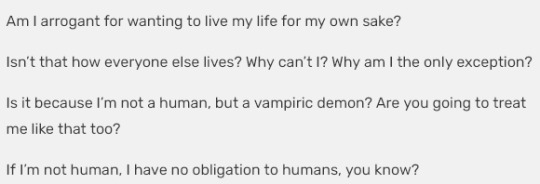
crossroad, i forgor which chapters
this of course marks a starting point of change that later results in him making up the wagahai pronouns persona - something he specifically created with the intention of looking vulnerable and weak. because he yearned to do less, to recover from years of exhaustion.
in a way, i want to say both, the ore pronouns persona and the wagahai pronouns persona, are attempts to cope with expectations he cannot handle physically or mentally. one relies on masking, on appearing stronger than he actually is and therefore invulnerable, and the other relies on exaggerating his weakness, in an attempt to finally let others recognize it. i think as a disabled person, both are performances one has to learn in order to "function" in everyday life, while remaining safe from serious harm (doing badly at ones job or classes, angering others that hold power over your life). since ones circumstances are often hard to grasp for someone who does not share the same illness, there is no choice but to simplify and exaggerate until symptoms become tangible concepts or to just brave through it, at the cost of ones health and future time.
rei in particular, for better or for worse, is incredibly capable when he needs to be and unfortunately that means others will often not take his health seriously because they saw him function just fine the other day. this is a general problem but an obvious offender in that regard is koga, who comments on reis fatigue constantly and loves to create a bit of a high expectations toxic work enviroment (and, to be fair, rei terrorizes him too. kogas hostility towards rei is sometimes ableist but not really rooted in ableism. after all koga is highly aware how performative the wagahai persona can be and is a huge motivational and inspirational factor in reis life. its a whole complex)
!! era holds some positive changes. his mental need to please other people remains a persistent source of trouble for him (and others) but he seems to really let his body recover and lives a more nocturnal life. both kuro and kaoru mention that he looks more healthy (in succession match???? i think??) since he finally stopped enforcing a normal day/night cycle on his body just to comply with social norms. you can indeed be very human even if you break human-made rules.
(additional comment: "becoming human" is of course a theme for each of the eccentrics and not uniquely tied to disability, it very much has to do with the objectification one goes through as a public figure. but this is a post about disability and it really fits in well. so here we go)
Literally Just a Realistic Teenager. Ritsu
ritsu, while not really being among my favourite characters, is my favourite instance of a disabled character in enstars. partly because of his writing and partly because my personal experiences overlap with his so much it sometimes is painful - but always extremely satisfying. just had to get that out.
ritsu is perhaps the most visibly ill. he blacks out and sleeps where he stands, everywhere, without control and often requires other peoples (well, mostly maos) assistance in order to remain safe when this happens. he also repeated a year of school, specifically because of his disability.
he is painfully aware of this. that he looks ill, that he behaves ill, that he is an underachiever compared to others of the same age, even to people younger than him.
ritsu developed unique behaviours to deal with this: he is very dependent and clingy and often asks others to do things for him, unapologetically. that does not mean asking for help doesnt hurt his pride, just that it is the most viable strategy for everyday survival that he ended up with. other than that, he clings more to the vampire identity than rei does. either to defy his older brother or, and this is important imo, because it is the one safety net he has to fall back on that makes him feel "normal" and like he is a regular being. albeit not human. no matter how much others might blame him for his shortcomings or how much he is a failure in the eyes of society, he is very regular for a "vampire". under the logic developed by his family, he is just a child, and the world at large is to blame. it is an easier truth to accept than facing systematic injustice and prejudice in a human world.
the stories i mentioned in another part above aside, i really love what ensemble band does for him; ritsu gets extremely irritated with mao in the prologue, seemingly out of nowhere. his character is allowed to express this sort of anger and to take it out on others, even if it is unjust and misguided. it is not pretty and it isnt good behaviour but it is a very heartfelt emotion to me.
its obvious that he cannot compete with others and that this will always been seen as his personal fault instead of a circumstance he cannot influence. and more than that: no one appreciates the real efforts he makes. for instance, getting himself out of bed in time for classes is difficult for regular teenagers and straight up hellish for ritsu. but he manages to do so a lot later on. instead of acknowledging that this is a real accomplishment on his part and possibly really exhausting and bad for his comfort in the long run, this is seen as doing the bare minimum.
while it is not correct, the malice ritsu sometimes treats others with comes from an comprehensible place. able-bodied ignorance can appear as purposeful slights made by those more privileged than him.
yet he learns to conform. his friends are important to him. knights success is important to him. (thought mental health probably played a role here too and made things even harder prior to his third year of high school) and yet;

seven bridge, chapter 24, but its really just an example i had at hand
the remarks stay the same. his peers still cannot help but brand him as "just lazy", even if they are kind and understanding otherwise and habour no ill intent. so i would like to ask: how long can he keep this up? how hard is this on him?
i dont think i need to explain just how common and hurtful it is to be accused of "laziness". probably the single most irritating comment someone with fatigue will hear every single day.
however, on the flipside, ritsu has perhaps the most people who care for him in comparison with other characters, though they sometimes complain (communication is hard, care is hard, everyone in enstars is very young and i cannot bring myself to see those comments as malice. its a mixture of ignorance and ones own burdens) there is mao, obviously. tsumugi is a very funny example. knights, of course, in particular naru. (at least based on my humble knights readings)
quite interesting how he just decided mao is his caretaker, now and in the future. i shared a few of my thoughts on caretaking here. this is.... a huge responsibility to just put on someones shoulders, to say the least. he shouldnt be doing this but i think it speaks for itself that this is a problem that is on his mind. ITS IS A REALLY IMPORTANT TOPIC TO BRING UP, especially since, the younger you are, the harder it is to get insurance to pay for your care. yes, he is often just teasing mao, but ritsu is looking for ways to get through life. by learning to be as independent as possible, whenever possible. though often you really just find yourself at the mercy of friends and family.
Inter-Sibling Violence
apologies, i will be done with the sakumas soon. i didnt know how to fit this in at the start.
the relationship between rei and ritsu, as people with the same disability who experiences different symptoms and challenges, is worth thinking about. infighting within people of the same disability is very common since experiences can be so different, there are no universal truths or opinions. with different lifestyles come different expectations for what is "normal" and sometimes pressure and social norms can cause someone to shift blame onto others who have no achieved the same things in life.
rei and ritsu are said to have been very close as small children and likely depended on each other a lot. i can see how reis fostering nature and ritsus needy nature developed alongside each other and enforced each other.
time and time again, rei says that he is a "less severe" case, that ritsu has it worse. he jets around the world because he feels forced to do so, when ritsu just wanted emotional support from him to begin with. ritsu stayed alone at home, sheltered and likely caged by their families convictions. but! i want to suggest the following: as much as it hurt him, it was important for reis health to be away from his family, too. i dont think staying there would have been good for him. his absence and the experiences he made away from home were an important catalyst for the positive family development we see in operetta.
of course, rei means well. he cares. he is trying to have a positive impact. yet from ritsus point of view, all of this must feel terribly condescending, especially with how much rei babies him. there is just one year between them. this is barely anything when it comes to sibling inferiority complexes the brain can make up. rei, who is successful and famous and beloved and, most importantly, proclaims to have it "easier than him", is trying to find a cure for him. from ritsus point of view this must be unbearable. their lives are so different when they basically started at the very same point of origin.
more than that, rei shoulders the sketchy blood rituals himself, out of love of course, but if one was more jaded, one could assume he doesnt think ritsu would be able to stomach the responsibility.
you will always compare yourself to your siblings in unhealthy ways but ritsu is just doing this on hard mode, i fear.
HHHRAGAHHHH GHHH ghgghrhgh. Niki
nikis writing is... driving me up a wall sometimes, to say the least. dont get me wrong, i love him. to an extend i understand that his single-mindedness and shallowless has purpose to it. in fact, i adore these character traits. he really seems to be behind four mental barriers at all times, unable to let deeper thoughts touch him, lest they make him succumb to despair. (yet nikis specific flavour of menhera cannot quite shine since... well, he has to stand next to himeru all the time)
the descriptions we get of nikis illness are nonsensical, at least to my knowledge. you could imagine he has something like hyperthyroidism. this never really gets explored though. at some point ENGstars mentions he has "gastroptosis or whatever" (the "or whatever" is part of his dialogue - niki really doesnt give a fuck), which makes no sense at all. weirdly enough, it would even be strangely in character if this was just a misconception.
so, can anyone take niki to a doctor? has this happened and i just wasnt there for it? there is no excuse why no one is considering medical care when it comes to him. except that he often is the butt monkey of jokes the writers want to make and has to stay available for it. more than that; his parents just left him alone like this? as a child? did he get an allowance at least? this cannot be legal, right? i wait for the day this comes up as a topic but i fear it is in vain. (please tell me if it actually did. i dont follow niki that closely) this is an unbelievable thing to do to a healthy child, yet alone one with a severe illness. we are basically looking at denial of assistance.
so many things surrounding nikis story are designed to make him as miserable as possible. i cannot help but feel that he exists purely as comic relief, for funny bickering, and superficial drama. i dont really like that at all, his misery just gets exploited.
EVEN SO... his self-image is actually really fascinating. as rinne likes to point out again and again, niki has no self-worth. he works two jobs, one of which he hates, he constantly gets into dangerous situations, and he will do anything just for some crumbs, and quickly forgets when others treat him badly. and of course, the worst bit:

es!! main story, please dont make me go find it
to some degree, he just accepts this as something he deserves. there is no consideration for his own quality of life, somewhere along the lines it seems like he got conviced just surviving is all he gets. he internalized self-degredation to a dangerous degree and i never see anyone mention this mental affliction specifically as a comorbidity of his disability. to me, there is without a doubt a relation here. sure, maybe he would still fight with this otherwise, just because he had to witness his fathers fall from grace as a child and knows there is a stigma attached to his name now. but i think you can tell it is more than that, from the way he is ashamed to beg (even in a life or death scenario, as seen in hot limit), as if his condition was his own fault.
this circles back to the point i made earlier for eichi; how much nikis life is worth, is measured in his economical value.
of the characters i have spoken of so far, nikis is financially the most accurate to real life. there is no safety net for him, no convenient family wealth.
(at this point it feels important to mention that somehow rinne manages to be the only person entirely aware of the danger and desires to change nikis mindset, YET he is a huge strain on nikis health. i dont know how those two function.)
Just a Lamb. Tatsumi
tatsumis specific trauma is a unique one: while most other characters struggle with conditions they were born with or developed as they grew up, tatsumis injury is the result of strain and violence. those are two different pairs of shoes, though the outcome may be similar. whether it is worse to be born into circumstances you cannot escape or to have to live with having something thrust upon you unfairly is up to personal judgement. pain is not really quantifiable. its just important to keep in mind, i think. under the circumstances tatsumi grew up in, he has his own burdens. it is very easy in many ways to compare and contrast him with eichi. of course this applies to how they used their bodies too: as an expandable resource. they had ideals for their school life (and beyond) that just seemed far more important and they both ended up in hospital because of this. (+ we know tatsumis surroundings were purposefully manipulated to destroy him)
and, of course, tatsumi got attacked later on. he never really talks about it directly but his legs seem to talk for him, in ways.
the story does not quite make it clear whether his occasional weakness and pain are the result of old injuries or entirely psychosomantic, and i dont think there is a real need to know, as a reader. in fact, in a certain light, i think it can be considered good that we dont know for certain: it would be relevant for tatsumi himself, sure, since it would influence which kinds of treatments and help he can seek out. however, i think the ambiguity may foster a certain level of sympathy in readers.
often psychosomatic problems are not taken seriously enough in real life: they cannot be proven physically and they dont fit into the neat little boxes that the ICD wants you to believe exist, so they cannot be defined on paper or easily explained to doctors or insurance providers.
to foster empathy with his situation requires his character to be lovable and for the narrative to treat him with care as well. which is thankfully the case. alkaloid are dear with him and, despite the fact he cannot perform in his work enviroment all the time, he is very respected for his other skills. he is a well-rounded person.
all that aside. it is absolutely worth to mention tatsumi pre-injury, too. he came up with a form of small-scale universal income among a semi-union at school. without getting too much into all that. (obbligato really seems like required lecture in the realm of enstars stories) the entire concept strives for social equality and is extremely anti-discrimination. it fundamentally goes against the idea that someone needs to "deserve" care, and is the opposite of the mindset i described with eichi and niki above. he never had to make first-hand experiences with disability to be extremely compassionate. this seems really rare among people in real life, even those who preach altruism.
While we are Here. K.... Kaname
as mentioned, i spoke a little about kaname before. so i wont get into the complex of caregiving.
it is extremely satisfying we got to meet kaname, if only for one event story. he does not have to remain a faceless motivation behind himeru and tatsumis lives, he thankfully became humanized.
the entire conflict around kaname at the moment is a matter of bodily autonomy. how much of your person can be in anothers hand, ethically? there is no excuse for the theft of his (idol) identity through himeru but the damage is done now. ideally, you dont want any part of yourself to depend on others but the disabled reality is that this is very often impossible. especially for kaname. there simply is no one else who could be responsible for him right now and, to be fair, at least when it comes to medical care, himeru seems to behave very responsibly.
repeating what has been said in the other post but i am worried for kanames seemingly inevitable reintroduction to the story. he has been in a comatose state for a year. if he wakes (since this is fiction, it is possible to exchange 'if' for 'when', realistically it really would be an 'if' though) he would most likely be confronted with permanent neurological and physical damage and years of rehabilitation. at least logically. (not to mention the psychological shock) would this be written with compassion and a sense of realism? it makes for a compelling source of conflict and emotional hardships that could be extremely worthwhile to explore. i just cant entirely bring myself to trust the writers with this one but i would love to be convinced otherwise.
that is, of course, if they dont somehow just skip rehabilitation entirely and declare it a miracle healing.....
imo, the in-game discourse between characters is just as important as his future development. i just really hope autonomy and recovery will be large topics.
He doesnt go here, but. Adonis
so bringing him up just really feels necessary within the context of this post because of his interests. one of adonis hobbies is sign language and accessibility.
this is, i think, maybe the best thing they ever did with his "protector" persona. it just fits so well, it is a direct conversion of ideals to actions. knowing undead songs have been translated for a deaf audience in canon is extremely wholesome and uplifting, even if it is entirely inconsequential for the story and just something that gets mentioned.
(now that sandstorm is out on engstars, you can check that out too for further mentions of this! if i could wish for one thing, it would be for the stories to acknowledge that there are tons of independent sign languages and i would love to know which one adonis and rei speak... you ever think about how adonis speaks like four languages fluently. at least.)
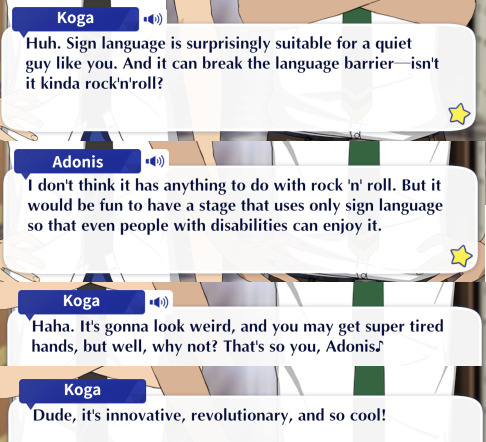
nightless city live, chapter 3
everyone in undead loved that and supported the vision. to see koga, who is usually against anything but musical performances and wishes to express art freely, praise the idea really puts deaf identity and accessibility in a great light. it is a very positively radical forwardthinking idea.
so, i just wanted to mention that. adonis is treated horribly by the narrative a lot, it entirely fails to grasp his identity and is insensitive towards foreign cultures, but i would die for him i think.
finishing thoughts
like mentioned, please absolutely let me know if you have different related ideas or recommendations. or corrections, or worries over something i wrote!!! learning and improving is always great. i am sorry i could not get into so many other characters, the ones i wrote about are those that i feel confident enough to comment on. in the future i would love to meet maguro!! i just havent really read any mama stories at all :'''3
i feel like i barely said anything at all and barely engaged with text enough since i didnt get into any character specifically. i would love to write another post about ritsu or rei or both. a draft for it has been sitting around for ages (as did the draft for this post, lol) but i hope someone will find an interesting thought in here somewhere.
all in all, enstars is actually... surprisingly nice to read for the disability in there??? even if it is disappointing in handling many other things. of course, the writings not always ideal (i read hidden beast just the other day and the ableism in there took years off my life) but often its really nice. nothing hits quite like seeing real emotions and experiences through some metaphorical stylized anime lense, you feel.
anyway thank you for listening. i am actually for real done now.
86 notes
·
View notes
Text
More from the doc: Every Tibetan Buddhist is a monk now!

Before getting to the most ridiculous part of this... While a minority of the endogenic community is trying to change the language, this community is largely separate from the tulpamancy community who actually use the language. The push to change language from systems who largely aren't tulpamancers and aren't part of the tulpamancy community would really accomplish little more than sew division between these distinct groups of plurals who should be united.
Thoughtform is a bad term for a mostly psychological practice because it has a long history in spiritual and pagan communities. (Source: My host was in a Wiccan community that made thoughtforms as a teen) It's not something new coined as a replacement. It's using a common term for a different phenomenon in a way that will create confusion.
"Willogenic" is a bad term, IMO, because it implies the headmates are simply "willed" into existence, diminishing the level of practice it takes many tulpamancers to create headmates. The tulpamancy community aren't going to go for that either.
Both of these are bad alternatives.
And I do consider it to be falling for anti-endo propaganda, because while there have been a few Tibetan Buddhists to express discomfort with the term, they've all been ones exposed to syscourse and anti-endo talking points. When the question was posed to Buddhist subreddits, most didn't have an issue with tulpamancers using the term.
There are also no debates about the tulpa being used in horror media or in Genshin Impacts "Hydro Tulpa" boss, showing this topic is exclusively confined to syscourse.
If the main variable for whether a Tibetan Buddhist finds it offensive is whether or not they've been exposed to anti-endo talking points or not before hand, I think that's something that should be taken into consideration.
Remember, you are not immune to propaganda.
Now, to the big thing though...
Do you think all Tibetan Buddhists are monks????????
Is "monk" to you just a word that applies to anyone practicing Buddhism???
Because as far as I know, exactly ZERO of the anti-tulpa people are Buddhist monks.
To be fair, none of the pro-tulpa ones are either. I don't think any actual monks/lamas have commented on this specific issue.
Now, I have pointed to the Dalai Lama, who is the highest monk in Tibetan Buddhism, saying the West and other religions could take Tibetan Buddhist meditations.

While broad, I think this can be extrapolated to apply to the practices tulpamancy drew inspiration from as well, establishing that Tibetan Buddhist meditations are open practices by default unless stated otherwise.
As of yet, I haven't found any evidence of a Lama or other spiritual leaders of Tibetan Buddhism establishing the sprul pa practice as some sort of closed exception.
But this paragraph from the doc highlights for me why I have a hard time taking the anti-tulpa side seriously. If you're going to white knight for a religion, you have GOT to learn the most basic facts about it.
Like, you know, how not everyone who practices the religion is a monk.
#syscourse#pro endogenic#pro endo#systempunk#syspunk#tulpamancy#tulpa#buddhism#religion#religions#tibetan buddhism#dalai lama#plurality#sysblr#system#systems#tulpa system#actually plural#actually a system
22 notes
·
View notes
Text
Navigating the Astrology Mysteries : Discovering Saturn’s Astrological House of Influence
Saturn is the only planet among all Nine planets ( As per Vedic astrology) which takes longest time (30 years) to revolve around Sun. It remains for 2.5 years in one Zodiac sign.
Because of the longest time and 2.5 years placement in zodiac sign-
Saturn is known for its Maturity.
Saturn took a long time before taking a decision.
Saturn has the ability to Command.
Saturn represents Longevity.
Saturn represents Service to Others.
Saturn represents Old age people.
Saturn does well almost in every house but the houses which needs extreme maturity Saturn does well in these kind of houses. These houses are 3rd, 6th and 8th house.
3rd house- This house deals with Media, Journalism, Writing skills, Verbal skills, Elementary education, Tongue and Fingers.
For Example, when any Paparazzi(Reporters who follows filmstars)has badly placed 3rd house then he/she will write or say silly things in disrespectful way about any celebrity. This makes a big impact on dignity of that celebrity ,both on personal and professional front.
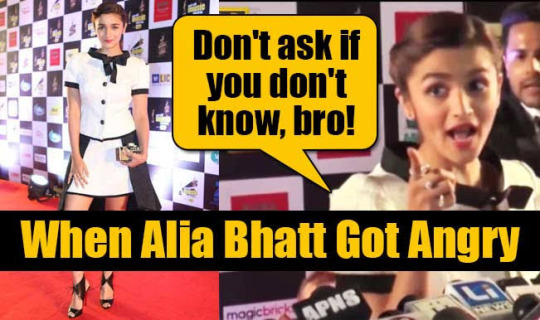
Classic example is Alia bhatt getting trolled for her IQ. In an open press conference, she got angry with the reporter on question related to general knowledge. This is insensitive from reporter side and has definitely affected mental well being of Alia Bhatt.
But placement of Saturn in 3rd house gives enough maturity to use one's tongue and fingers for the good purpose.
6th house- This is the house of Controversies, Enemies, Daily Wages, Court Cases and Debts.
For Example, if one's 6th house is badly placed then a person will fight on silly things with other people for just short term pleasure and thus can be regularly trapped into controversies like court case, harassment, etc.
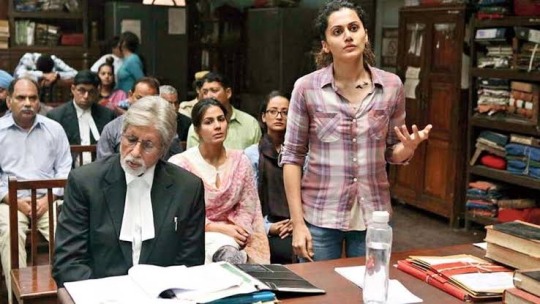
People with placement of Saturn in 6th house have enough maturity to stay away from controversies, enemies and taking debts because they can see the repercussions of these problems.
8th house- This is the house of Obstacles, Deadly situations, Criminals, Serial killers, Dark Energies, Mysteries, Ghost and Occult.
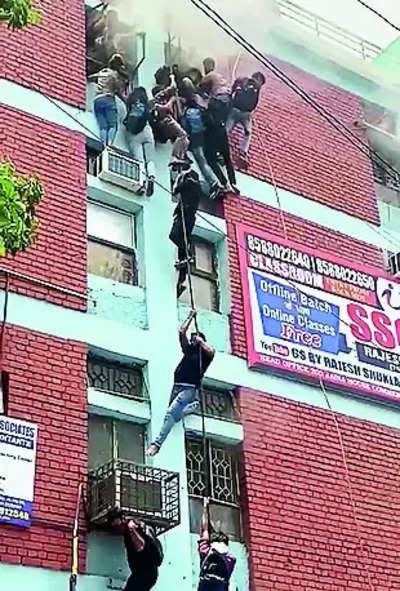
For Example, if someone's 8th house is badly placed, then a person will be very impulsive, fearful and can be easily assassinated by dark energies/people. There are high chances of accidents also.
People with placement of Saturn in 8th house are psychologically very strong when dealing with dark energies/people and respond to situations instead of reacting to the situations.
Note- Saturn if Debilitated, Retrograde, Combust, Conjunct or aspected by Rahu, Ketu and Mars can fluctuate or change the results.
#astrology#astro community#astro placements#vedic astrology#vedic chart#vedicknowledge#vedic mythology#viralpost#astro#zodiac#mystery#zodic signs#astro notes#astro observations#aries#virgo#papparazzi#aliabhatt#pastel pink#pink#viral trends#viralpage#saturn#gaza
86 notes
·
View notes
Text
Part of this book I'm reading rn is making me think about words; specifically, about the (potential) differences between: original use/intention, formal definition, and colloquial use
To be clear, I am of the opinion that language is a tool, first and foremost. It is not a law, it is not an absolute; it is inherently fluid and changeable, and all ways of interacting with it are valid ones.
Shared definitions are crucial for accurate communication, of course. But the evolution of words and terms is something that has occurred in the past, is occurring in the present, and will inevitably occur in the future. Sometimes these changes are the result of a deep misunderstanding of the original and/or formal definition, sometimes even to the point of having the opposite meaning - or seemingly opposite terms sharing the exact same meaning! Such as "regardless" and "irregardless," or "flammable" and "inflammable".
Other times it is because there is an intuitive understanding of the word - perhaps drawn from its spelling and perceived cognates - that does not fit the original and/or formal definition. And sometimes it's simply because one person got it wrong and a lot of people got it wrong from them.
On a personal level, I am a strong advocate for retaining the meaning of certain words (and their potential diminutives), largely ones that have to do with diagnoses and symptoms. The reason for this is because of the tendency for people - including on social media, but hardly exclusive to that setting - to bastardize the meaning of certain terms, and the direct, negative impact that has on people who are so diagnosed or experience the relevant symptom(s). Things like OCD, bipolar, "schizo", "delulu", manic, paranoid, split personality... all of these are things - or are derived from things - with a specific medical/psychological context.
Another thing I tend to point out as a false connection is the linking of morality to certain ways of being. Low/no empathy being a big one at the moment, and the idea that such people are inherently evil.
But otherwise? I am open to natural fluctuation on a lot of things.
Take my being trans, for instance. It was not long ago that transsexual was the go-to term. That it is less popular, even frowned upon at times, in the modern (and western) culture does not diminish its historic value or resonance with people, both past and present - and potentially future people, as well!
And when I was first transitioning, FtM was the familiar description for people like me. Then transman/transmen. Then men*. Now trans man/trans men. Of course, as many people have pointed out, linguistic changes happen fast online, taking off and crashing in potentially very short lengths of time.
But something like villain, which was a recent conversation I had with multiple people, is inherently flexible. Even "formal definitions" vary, some claiming that villains were evil (applying a morality to them) while others posed them more strictly as a narrative role, without any connective moral implications. The definition me and my mom held of the word was different; and so too was our definition of the word "evil," which was part of our following conversation. This was fascinating to me!
And those who learn the meaning of the word "villain" in school settings are exposed to different definitions. One class may learn it as "evil character," and the next years class - even with the same teacher - may learn it as "primary antagonist".
In school, I was taught and trained in the value of asking these questions. And, lucky me, it gels very nicely with the particular way that I am autistic! But it is a useful skill, I think, particularly for de-escalating or outright avoiding heated moments in conversation. Asking for clarity is sometimes frowned upon, but should not be; it is a vulnerable position, and an important one to take.
Vernacular within a community tends to be meaningless or have different meanings outside of that community, too. I trained as a dental assistant, so I'll use that as an example: in dental settings, we say "doctor" to mean "dentist." This is both accurate, and generally (at least in my limited experience) considered respectful.
DDS (Doctor of Dental Surgery) or DMD (Doctor of Medicine in Dentistry/Doctor of Dental Medicine). They are doctors, and either title means they have earned the right to be so addressed.
And when I am speaking of dentistry, I still tend to refer to the dentist as the doctor, and then have to clarify that, no, I am not suddenly talking about a MD (Doctor of Medicine) or DO (Doctor of Osteopathic Medicine).
So, conversations about a strict definition of the word "doctor" fail before they begin. Doctor is a term with a range of contextual meanings, from the medical profession to dentistry (which is part of the medical profession, even though it's often treated as a separate, stand-alone thing), to a PHD, a Doctor of Philosophy. Calling any of these professionals - or any who have also earned the title which I am not familiar with - "doctor" is entirely accurate. At the same time, pausing to ask what someone means when they say "doctor" can help clarify their meaning.
Outside of development within a specific cultural group over time (as is the case with the various permutations of expressing a transgender identity) or the differences between what I will call cultures of specialization (including hobbies, interests, and professions), there is also the obvious one: cultural differences. This time I am using "cultural" in its more typical way (another example of my point!), referring to groups of difference, whether through gender, class, race/ethnicity, geographic location, or anything else.
And any of these forms of cultural differences can be and frequently are interconnected, and may also interact in complex ways with matters of language differences and imperfect translations, as different languages have separate, inherent structure which frame meaning, and sometimes that structured meaning can be translated readily... and sometimes it is extremely difficult to translate.
So while I advocate for retaining meanings in some cases, this is why I am generally in favor of acknowledging differences in definition. Language is a tool for communication, and it is an amazing, powerful tool... but it is an imperfect tool! And that's okay! We can ask questions! We have that capacity, too.
3 notes
·
View notes
Text
Stalker Roleplay [M4M, Long-term, Discord, Semi-Literate to Advanced]
TLDR: My character is a batshit man with a habit of stalking. He would pair well with a mean/distant older guy who is maybe a therapist, psychologist, or southern lol. He also would pair well with a younger guy who’s a fellow addict and/or very pathetic. This will be a toxic storyline!!
Hey there! I’m Cain, I’m 20, and I’ve been roleplaying in my free time for a few years now. It’s been a while since I’ve done any long-term stories, and I’m super excited to get back into it! As an artist, I prefer to roleplay with other people who also draw! I enjoy making art of my roleplay partners’ characters and doing art trades, but it’s pretty one-sided with a non-artist. I understand how this can be seen as rude or picky, but I just write better with fellow artists, sorry!! One of the main things I’m looking to do is merge my characters canon storyline with that of my partner’s character!
I do not have a super specific plot in mind, as I want room to be able to shape it to be perfect for both of our characters. However, this is for sure an angsty roleplay.
The character I will be using is named Cypress, a troubled man who immigrated to America from Poland. Growing up as a girl, he struggled to make friends due to his aversion to people. Peers saw him as strange for his intense obsessions over certain topics, as well as the extreme emotions he lacked control of. This, along with many other signs, led to him getting diagnosed with autism early in life. In his teen years, he discovered that alcohol could make him feel ‘normal’ and he could finally enjoy being around others. As he got increasingly comfortable sneaking out to parties and drinking heavily, he opened his horizons to other substances. In one of these parties, a ‘friend’ of his would hook up with him while he was heavily inebriated. When his family found out he was pregnant weeks later, Cypress was forced to marry Jacob and drop out of school. About a year later, with his new husband wanting to start a business in America, he had to move away from the few friends he had. Though, Jacob’s business wasn't booming as they had hoped, and they lived in poor conditions. Cypress tried to stop drinking for the sake of his son, and was successful for a short period. However, Jacob had his own alcohol issues, which developed into misdirected anger and abuse. While Cypress was verbally and mentally abusive towards his husband, Jacob was arguably more brutal. Three years after being married, Cypress’ husband attempted to kill him during one of their drunken arguments. He survived, and Jacob was imprisoned for his actions. Nonetheless, this led Cypress into a downward spiral. He had no job and his mental health was rapidly deteriorating. Instead of getting one, he turned to thievery and selling his nudes online. The only highlight in all of this was that he gained the freedom to begin his transition. Otherwise, things continued to get worse. His marriage undoubtedly left a detrimental impact on the relationships he would form. What started as learning about people he liked online slowly turned into staring through their windows late at night. Repeated offenses of stalking and harassment led to him losing custody of his son, and he lost the one thing that kept him somewhat grounded. Now, Cypress spends his time stalking different people who aren't interested in him and smoking with his buddies. Anyone who happens to actually have feelings for him is ignored and pushed away, as he only has interest in people when they don't like him.
I want this roleplay to be about one of Cypress’ obsessions. He tends to get more attached to older men than younger ones, but it overall depends on the person. Additionally, one of his hyperfixations is cowboys, so anyone with a Southern accent is automatically a target, lol. If he’s forced to go to court-mandated therapy, I can also see him developing a thing for his therapist or psychologist, even if he doesn't like them at first.
If you’re interested or have any questions, feel free to message me! I love to chat with my roleplay partners OOC, too, so never hesitate to reach out. :)
Note: While I love some good NSFW scenes, I don’t want this story to be purely smut. That being said, this roleplay will have more of those scenes than my other ones, as Cypress has a high libido and is a FREAK.
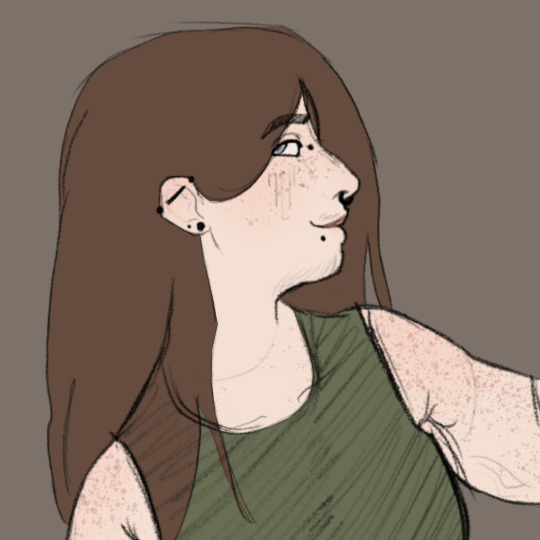
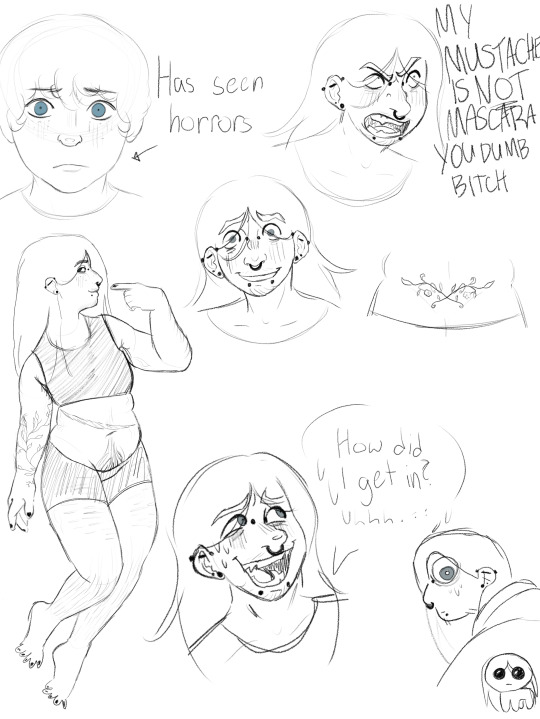
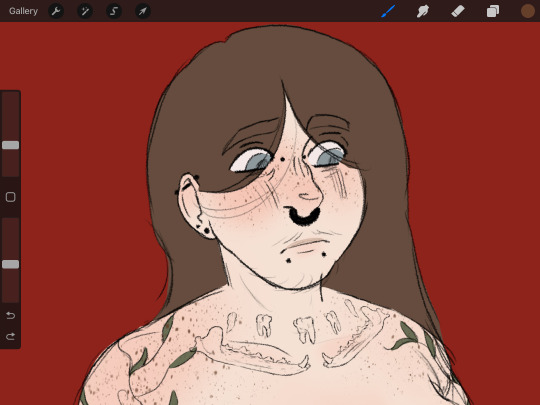
2 notes
·
View notes
Note
I'm not necessarily pro-circumcision, but there ARE studies done on the safety and benefits of circumcision. In fact, in areas where STIs are very common, circumcision shows a marked negative impact on infection rates, including diseases like HIV. It also decreases incidence of genital herpes and penile cancer. I work in a NICU. I see circumcisions every day. Is it a perfect procedure? Not at all. It can be quite uncomfortable and no procedure is without risks. But it's not done without anesthetic and the babies almost always heal very quickly. I can't convince you in an anonymous ask on tumblr and I don't want to try, but you should look into some peer reviewed studies on circumcision on both sides of the argument.
Yeah anon. I’ve looked at peer-reviewed studies. And no amount of “oh well it SOMETIMES decreases risks of transmitting HIV” is going to justify the permanent mutilation of infant genitalia. As someone said in the replies on my first post, removing finger and toenails from infants can keep them cleaner and help prevent them from scratching themselves, but we aren’t going around removing those are we?
For any instance you can pull up of someone having a lower infection rate of HIV I could pull up an instance of an infant circumcision being botched to the extent the penis is lost or disfigured beyond just loss of foreskin.
It’s a matter of bodily autonomy, not a matter of if the infant remembers it. There are studies to show they do experience long term pain responses during recovery and psychologically it may impact how they react to contact with their genitals later in life. There’s also loss of sensation and less pleasure for partners because a circumcised penis head will generally displace lubricant and cause more friction that isn’t necessarily pleasurable.
40 notes
·
View notes